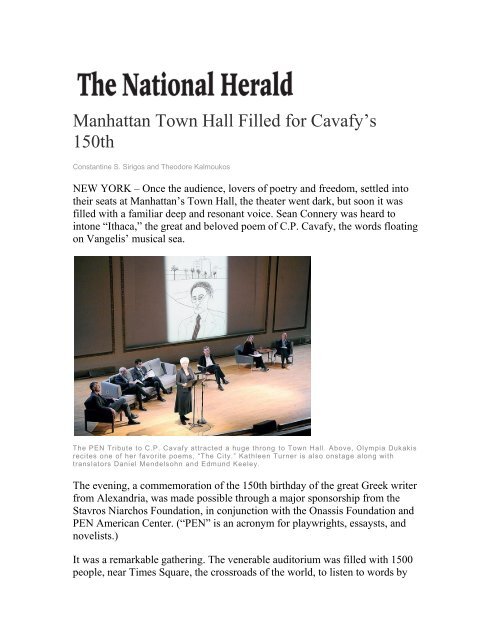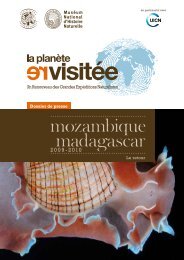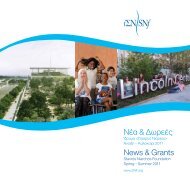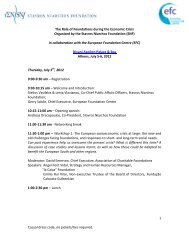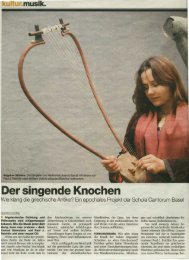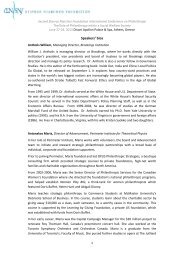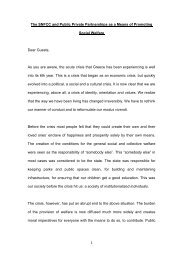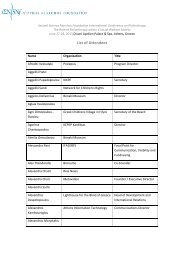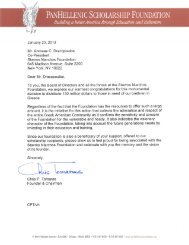Manhattan Town Hall Filled for Cavafy's 150th - Stavros Niarchos ...
Manhattan Town Hall Filled for Cavafy's 150th - Stavros Niarchos ...
Manhattan Town Hall Filled for Cavafy's 150th - Stavros Niarchos ...
Create successful ePaper yourself
Turn your PDF publications into a flip-book with our unique Google optimized e-Paper software.
<strong>Manhattan</strong> <strong>Town</strong> <strong>Hall</strong> <strong>Filled</strong> <strong>for</strong> Cavafy’s<strong>150th</strong>Constantine S. Sirigos and Theodore KalmoukosNEW YORK – Once the audience, lovers of poetry and freedom, settled intotheir seats at <strong>Manhattan</strong>’s <strong>Town</strong> <strong>Hall</strong>, the theater went dark, but soon it wasfilled with a familiar deep and resonant voice. Sean Connery was heard tointone “Ithaca,” the great and beloved poem of C.P. Cavafy, the words floatingon Vangelis’ musical sea.The PEN Tribute to C.P. Cavafy attracted a huge throng to <strong>Town</strong> <strong>Hall</strong>. Above, Olympia Dukakisrecites one of her favorite poems, “The City.” Kathleen Turner is also onstage along withtranslators Daniel Mendelsohn and Edmund Keeley.The evening, a commemoration of the <strong>150th</strong> birthday of the great Greek writerfrom Alexandria, was made possible through a major sponsorship from the<strong>Stavros</strong> <strong>Niarchos</strong> Foundation, in conjunction with the Onassis Foundation andPEN American Center. (“PEN” is an acronym <strong>for</strong> playwrights, essaysts, andnovelists.)It was a remarkable gathering. The venerable auditorium was filled with 1500people, near Times Square, the crossroads of the world, to listen to words by
and about the man from those ancient crossroads whose Greek communitiesvanished long ago, the Alexandria of Cavafy’s birth, and the Constantinople ofhis <strong>for</strong>efathers.In a sense, Cavafy was a freedom fighter – one of PEN’s functions is topromote a literary culture and to protect freedom of expression – hiscourageous and pioneering presentation of homoerotic themes accounts <strong>for</strong>much of the overwhelming response of New Yorkers, but he is also revered byGreeks and Philhellenes alike <strong>for</strong> his evocation of ancient Greek and Byzantineworlds that still fascinate.In advance of the event the audience was most curious about the warning thatthere would be full frontal nudity, and as the time and words flowed, waiting<strong>for</strong> the “bodies” evoked “Waiting <strong>for</strong> the Barbarians,” one of the most favoriteCavafy poems.The lights came up to reveal a set that looked like a huge living room: two largecouches, five chairs.Soon, the living room was populated by distinguished devotees, including histranslators, Edmund Keeley and Daniel Mendelsohn, Orhan Pamuk, theTurkish writer who was born in Constantinople and won 2006 Nobel Prize inLiterature, and actresses Olympia Dukakis and Kathleen Turner.
For much of the program, a huge video screen displayed the above line drawing of the poet inlate middle age with his city’s famous Corniche seashore sketched in the background.Andre Aciman, Michael Cunningham and Mark Doty were there, too, joined byArchitect Craig Dykers of the international firm Snohetta, who spoke about themodern rendition of the Great Library of Alexandria that they helped create.Choreographer/Director Dimitris Papaioannou, renowned <strong>for</strong> his 2004Olympics opening ceremonies, created a live dance per<strong>for</strong>mance and videoworks based on <strong>Cavafy's</strong> most famous poems.The rich and extensive program served to open windows on both the man andhis city.
Pulitzer winner Michael Cunningham read his piece titled “Cavafy be<strong>for</strong>e HeWas Cavafy,” and “Longings” by Harry Kremmydas was translated and readby Mendelsohn. He mused “why are famous people remembered as old men?”The readings, videos and photos shined a light on the young man who was thesubject of the powerful feelings he later famously expressed.The audience viewed “Prayer” is an extract of videos by Papadimitrioufeaturing 13 Cavafy poems, Pamuk presented his “Poet on the Periphery” andAciman read his piece “Alexandria Irrealis.”People responded strongly to the two actresses. Turner read the poem “LovelyWhite Flowers” and the “Mirror in the Entrance” and Dukakis gave a movingreadings of “The City” and “The God Abandons Antony.”They were joined by Kremmydas to read Cavafy’s poignant “Days of 1908,”which begins: “That year he found himself without a job. Accordingly he livedby playing cards and backgammon, and the occasional loan.”Eventually, the house party came to an end and the stage was cleared.But audience was still owed some nudity, apropos of the longing that permeatesso much of the poet’s work.After the audience had a few moments to themselves, to check their cell phonesor share their thoughts with their neighbors, they looked up to see a stage handdragging what looked like a huge piece black metal backed by plywood.The metal board suddenly fell with a thud, revealing a naked youth.One gathered that the clothed man, mustachioed and clad in black – it wasPapaioannou, who created the piece and called it “Primal Matter” – representedCavafy.The meaning of what followed became a topic <strong>for</strong> discussion after theper<strong>for</strong>mance. The youth, the beloved, was first washed with a towel and waterfrom a small basin.The naked man sat on a rolling office chair, doing the relationship danceeveryone knows, regardless of their orientation – the beloved comes near, goesfar, bails out and sometimes returns. Some painful contortions reminded inCavafy’s time the love he sought was <strong>for</strong>bidden and dangerous.
The sexual significance was obvious, but the dancers presented the otherelement of the erotic, the spiritual, illuminated <strong>for</strong> the Greeks in the audienceby the Orthodox Christian marriage service and <strong>for</strong> the rest by the Song ofSongs and by the Book of Genesis: “and they become one flesh.”After a series of movements, the man in black loses his socks – and only hissocks. He finds himself below the other, until, finally, the standing youthappears to have appropriated the other man’s legs, his knees joining the Cavafyfigure’s calves, and after a final humorous but erotic move…the stage goesdark.But the darkness is not merely an absence.After the dancers disappear, the audience is confronted with absolute loss. Theyare face to face with perhaps the most <strong>for</strong>mative <strong>for</strong>ce in Cavafy’s life: Death.Earlier, Mendelsohn’s presentation “A Poet Trans<strong>for</strong>med” was a fascinatingexamination of how one of Cavafy’s early works was transfigured from a finepoem into a great one after what he called “those ten cruel years,” marked bystruggle and the death of one loved one after another.“Sweet Voices” became, simply, “Voices.”Power was gained through the loss of adjectives and adverbs, the very elementsthe “oi poloi” believe are the essence of poetic writing.Genius bestows so much the world misses or <strong>for</strong>gets.November 21, 2013http://www.thenationalherald.com/article/61596


